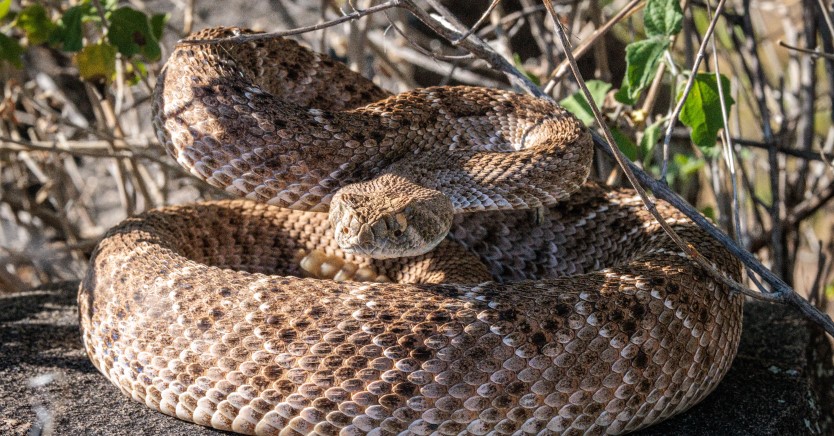Ask Dr. Jenn: How Can I Protect My Dog From Rattlesnakes?
I love to hike with my dog in the summer, but am worried about rattlesnakes. How do I keep my dog safe from snake bites?

There are about 20 different species of rattlesnakes found in the United States, most commonly in the desert areas. Rattlesnakes are members of the pit viper family, meaning they have a heat-sensing “pit” located between their eyes and nostrils to locate potential prey. Other members of this family include the copperhead snake and cottonmouth snake.
Pit vipers secrete venom when they bite. The venom breaks down blood vessel walls leading to swelling and affects the blood’s ability to clot. It also causes destruction of red blood cells. Death usually occurs from circulatory shock due to blood loss and blood destruction.
Snake bites are intended to immobilize their prey. The venom helps to start the digestive process before the snake consumes the prey. They will also bite if they feel threatened or are startled. An inquisitive dog who stumbles upon a rattlesnake will often get bit in the nose or extremities.
The good news is that not all snake bites are equal. The severity of the bite depends on a number of factors, including the species of rattlesnake, the size of the dog, the location of the bite, how much venom was injected, and the age of the snake. In approximately 25% of snake bites, no venom is injected. Thirty percent are mild, causing just local swelling, 40% are severe, and 5% can be fatal.
The bad news is, you can’t predict whether your dog’s bite was a “dry bite “with no venom or enough venom to cause a severe reaction. Given that almost half of rattlesnake bite fit into the severe or fatal category, prevention is key to protect your dog.
Avoid areas were rattlesnakes are more likely to be found. They like to hide under brushes and rocks or in the tall grass along rivers. Stick to the trails and keep your dog on a leash. Some trainers also offer classes to teach your dog how to recognize and avoid rattlesnakes.
A vaccine has also been developed to lessen the effects of rattlesnake venom. Talk to your veterinarian to see if your dog is a candidate to receive the vaccination series. A vaccinated dog will still need medical attention, but it could mean the difference between a fatal reaction and a mild reaction.
If your dog gets bit by a rattlesnake, seek medical treatment immediately. It is a good idea to know the phone number and location of the nearest veterinary hospital before you hike. Apply a cold pack to the area of the bite to lessen swelling and slow down the spread of the venom until you can reach a veterinary hospital.
You may not see your dog get bit by a snake, especially if he wandered off to explore, so it is important to recognize the signs. Look for sudden swelling and puncture wounds. Your dog may be more restless, be drooling or vomiting, or may suddenly seem uncoordinated. Again, rapid treatment is key to your dog’s recovery, so if you even suspect a bite, seek medical treatment immediately.
Hiking is a wonderful way to spend time with your dog. Don’t let rattlesnakes keep you away from doing what you both love. But keep your guard up and be prepared.
Ready to start saving money on pet wellness care?
Then take a look at Mint Wellness, the pet wellness plan that provides fast reimbursement on routine pet care. Save on vaccinations, wellness exams, preventatives, dental, and more!
Learn More